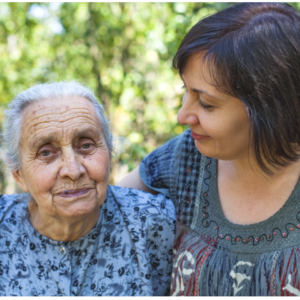Kinship: The Dilemma Of Dealing With Aging Parents

Kinship: The Dilemma Of Dealing With Aging Parents
July 28, 2021
No doubt, the visits between the generations have likely resumed. Whether you’re finally hugging your grandchildren again or are reckoning with your parents’ “aging-in-place” plan, you’ve likely made your mental list of what was lost during the pandemic and what can be rekindled or strengthened. Particularly for those who are the adult children of older parents, it may feel like the time lost can never be recaptured and the diminished physical or mental status you see in your parents is a new reality- one for which you may need guidance and support. For previous agebuzz posts on the challenges of supporting aging parents, read here.
First, you may be experiencing emotional turmoil. As a recent article made clear, the transition of watching your parents turn from your protectors to those in need of protection can be jarring and stressful. Not only are we “pre-programmed” to be ageist in our attitudes (disdainful of someone walking slowly or repeating themselves, for example) but inevitably, such images conjure up our own mortality and aging. Experts suggest that as an adult child, you may experience a kind of subtle grief as your parents decline, sad for their situation and yours as well. You may also be struggling with how to “make things better,” even though you know in your heart that you likely can’t- nor is that your role. What can be your role is to find the small things that can make a big difference, be it your regular presence, connection or communication.
Of course, you may not always have a cooperative partner in that regard. Afraid of your “overprotectiveness,” some older parents may view your discussions akin to being demands and thus be more selective about what they’re willing to reveal to you or what kind of help they’d welcome. A study from Penn State found that 77% of adult children believe their parents are stubborn in taking their advice. As one aging expert warns, “The reality is that even with good intentions, we have limited power and influence over an adult who refuses to get additional help.” Instead, you are urged to understand the conversation from the point of view of your older loved ones and advised that sometimes a 3rd party can make headway where you’ve been unable to when it comes to supporting an aging parent.
As for third parties, it turns out there are a lot of newly developed sources of consultation and help available, many of which arose during the pandemic when caregiver stress was sky-high. For example, Liz O’Donnell, a caregiving expert and the founder of the website Working Daughter, now has an online service of caregiver support and consultation. There’s also a new website known as Sustainable Caregiving, started by certified caregiver consultant Theresa Wilbanks, that provides individual consulting for those who have caregiver challenges. Then there’s the new online consulting service Mettle Health, developed by renowned palliative care doctor BJ Miller, that not only provides one-on-one support for those struggling with serious illness but can respond to questions and concerns from caregivers as well. Finally, for some written support, you may want to check out the list of books suggested by journalist Steph Auteri, who recently published the post, “The Books Keeping Me Grounded As I Contemplate Becoming A Care Partner To My Parents.” Her suggestions and her own personal struggle may be the helpful advice you need right now.







